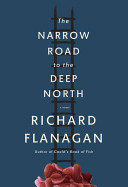 Richard Flanagan, an Australian writer born in Tasmania, whose father survived labor for the Japanese in the Second World War, has written a compelling, mesmerizing and thoroughly memorable novel of that period. And it is the 2014 Man Booker Prize winner!
Richard Flanagan, an Australian writer born in Tasmania, whose father survived labor for the Japanese in the Second World War, has written a compelling, mesmerizing and thoroughly memorable novel of that period. And it is the 2014 Man Booker Prize winner!
The Aussies in the story are led by Dorrigo Evans while his physician officer tries to save his troops from starvation, disease and beatings as they attempt to build a rail line for the Japanese through the jungle from Siam to Burma. They are controlled by a few Japanese, consumed with love for their country, their emperor and for the poet Matsuo Basho, whose most famous work is the title for the book.
You will remember the names: Darky Gardner, Rabbitt Hendricks, Rooster MacNeice, Wat Cooney, Gallipoli von Kessler, Jimmy Bigelow and their captors, Colonel Shira Kota, Major Tenji Nakamura, Lieutenant Fukihara and The Goanna, Corporal Aki Tomokawa. Flanagan follows many of them, plus Evans, in shifts of perspectives and time, from present to past, with uncanny ability to maintain our interest and understanding. But did any of them really understand what they experienced?
It is a story of obedience and disobedience. The Aussies (and many of us from the West) are intuitively and culturally critical of authority: when an order is issued, their (our) first instinct is to ask “Why?” The Japanese, and many Eastern cultures, in contrast, are taught to revere “authority.” Their reply to an order is an immediate “Yes!” Flanagan explores this natural friction, one that seems to continue even after the war.
Dorrigo Evans’ inability to connect with family and friends after the war is explained with these words:
“It did not fit within the new age of conformity that was coming in all things, even emotions, and it baffled him how some people now touched each other excessively and talked about their problems as though naming life in some ways described its mysteries or denied its chaos. He felt the withering of something, the way risk was increasingly evaluated and, as much as possible, eliminated, replaced with a bland new world where the viewing of food preparation would be felt more moving than the reading of poetry; more excitement would come from paying for a soup made out of foraged grass.”
Evans goes on: “Adversity brings out the best in us . . . It’s everyday living that does us in.” And he gives us the perfect conclusion to this novel: “A good book, he had concluded, leaves you wanting to reread the book. A great book compels you to reread your soul.” The Narrow Road to the Deep North comes close to “the elegant mystery of poetry.”
And it is the poetry, the haiku, of Matsuo Basho that intrigues both Evans and his Japanese captors. So that inevitably led me to his The Narrow Road to the Deep North (in Japanese: oku no hoso-michi) his story of a 1689 walk from Edo (now Tokyo) north along the east coast of Japan, then northwest through the mountains, and finally southwest by the Japan Sea. In it are some of the poet’s most memorable haiku. Consider these:
Furuike ya Old pond
Kawisu tobikomu Frog jumps in
Mizu no oto Sound of water
Flanagan incorporates Basho with a line late in his novel: “ . . . the fish fell into the sound of water.”
Natsugusa ya Summer grasses
Tsuwamono domo ga All that remains
Yume no ito Of mighty warriors’ dreams
And Flanagan’s final sentence: “Of imperial dreams and dead men , all that remained was long grass.” I suspect I may well have missed other allusions to the poet’s famous haiku.
And for a more recent view of Basho’s walk, try Lesley Downer’s story of retracing his steps in the early 1980s.
A novel to read, reread and think on. Rightio, mates!
Editor’s Notes: Book details are as follows:
Richard Flanagan, The Narrow Road to the Deep North, Alfred A. Knopf, New York 2014
Matsuo Basho, The Narrow Road to the Deep North, translated by Nobuyuki Yuasa, Penguin Classics, Baltimore 1966
Lesley Downer, On the Narrow Road, Summit Books, New York 1989

About the author: Felix Kloman is a sailor, rower, husband, father, grandfather, retired management consultant and, above all, a curious reader and writer. He’s explored how we as human beings and organizations respond to ever-present uncertainty in two books, ‘Mumpsimus Revisited’ (2005) and ‘The Fantods of Risk’ (2008). A 20-year resident of Lyme, he now writes book reviews, mostly of non-fiction that explores our minds, our behavior, our politics and our history. But he does throw in a novel here and there. For more than 50 years, he’s put together the 17 syllables that comprise haiku, the traditional Japanese poetry, and now serves as the self-appointed “poet laureate” of Ashlawn Farms Coffee, where he may be seen on Friday mornings.
His wife, Ann, is also a writer, but of mystery novels, all of which begin in a bubbling village in midcoast Maine, strangely reminiscent of the town she and her husband visit every summer.